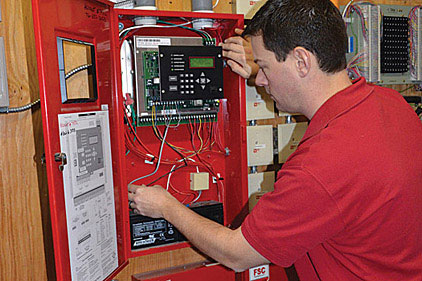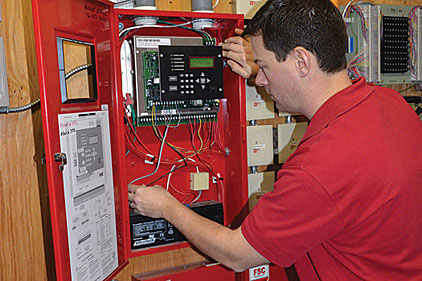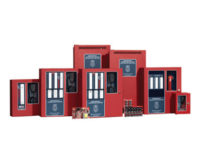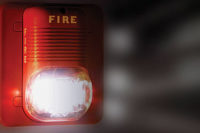
|
| Shawn M. Gorgan, vice president of service operations at FSC Systems, helped Alfred University integrate its fire and safety systems. |
FSC Systems LLC of Jamestown, NY, began installing Farenhyt technology from Honeywell company Silent Knight on the 52-building campus eight years ago as school officials sought to replace an older, patchwork of fire alarm systems. The performance of the initial Farenhyt equipment installed by FSC proved reliable to school officials, who continue to call on the integrator for on-going upgrades of older systems.
“FSC put our first system in years ago,” says Mike Neiderbach, Alfred University’s executive director for capital operations and legal affairs. “We like the way it works, it’s pretty simple to handle, and we don’t have problems with it. In my book, that’s a big thing.”
Brian Dodge, physical plant director at Alfred, said many of the buildings had older zone systems, some more than 30 years old, and the college wanted to move to addressable technology.
“We wanted a system that was modern, that could identify specific locations where there was a problem,” said Neiderbach. “Some of our buildings’ older systems were also not user-friendly, particularly for the fire department.”
The new systems’ addressable technology provides detailed information on the type of issue detected and its exact location. This type of specific information is also displayed on remote annunciators installed with the new systems at entryways of buildings to quickly inform firefighters and facility/security officials.
More than half of the campus’s buildings are now protected by Farenhyt fire alarm systems. Dodge asserts the flexibility of a fire alarm system is key. Farenhyt systems have been deployed in buildings of assorted sizes, from the 60,000 square-foot Powell Campus Center to single-family housing units.
“We’re able to buy small systems, not just big systems,” said Dodge. “We basically tailor the size to what we need.”
And it will be easy to scale up the Farenhyt systems should the buildings be expanded and added to in the future, said Dodge.
The Alfred campus made use of the Farenhyt line’s retrofit advantages by reusing much of the existing infrastructure for upgrades, including wiring, detector sounder bases and more. That saves money both in terms of materials and labor.
Additional cost savings have been realized simply through the lack of maintenance needed with the new systems. The older system was a constant drain on both funds and time, explained Dodge, requiring constant replacement of smoke detectors.
“We’ve definitely cut that way down with the new Silent Knight system,” he said. “We have so many buildings and a very small staff to go out and check everything out. The more bullet-proof everything is the better.”
While most of the installs on campus have been fairly straight-forward, FSC did install some specialized equipment, including explosion-proof technology in school chemistry labs, monitored by the new fire alarm system.
With New York being one of many states to set new CO detection requirements for commercial sleeping areas, CO detectors tied to the new fire alarm systems were installed throughout all Alfred residence halls.
To control the flow of smoke from a fire, the new fire alarms in several campus buildings were interfaced with the energy management systems to force fans to shut down and control other mechanical systems to respond as necessary.
As the university’s needs adapt, officials may look at other technologies that integrate with the Farenhyt systems, such as mass notification capabilities.
“The system is flexible that way — we’re able to adapt,” said Neiderbach.
FSC is now working on a large Farenhyt system in Alfred’s health and wellness center, which is currently under construction, according to Shawn M. Gorgan, vice president of service operations at FSC Systems. It will include a Fire Alarm Aspirating Smoke Technology (FAAST) system to provide very early warning of fire detection in the new gymnasium and track area. A highly-sensitive detection system, FAAST draws continuous air samples through a network of pipes to immediately detect the slightest trace of smoke, even in the most highly challenging environments.
“We’re very big on safety here. If I send my kids to a college, I expect the first and foremost thing is to keep them safe,” said Dodge. “That’s one of our big reasons for upgrades — more coverage, more safety, a better system.”




